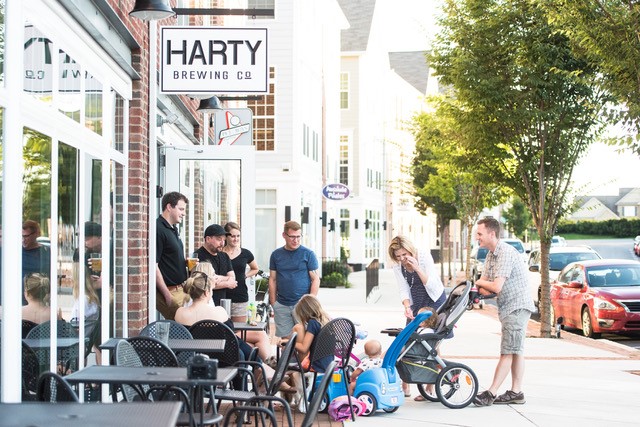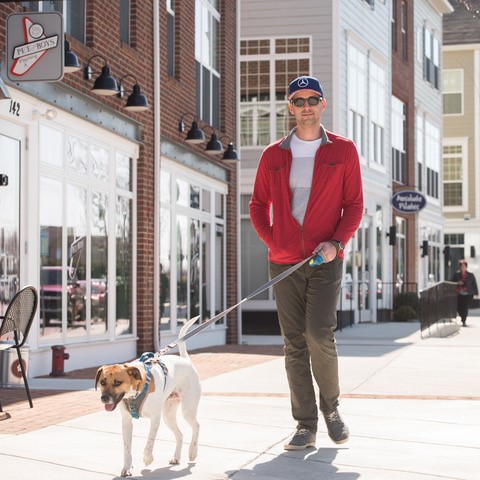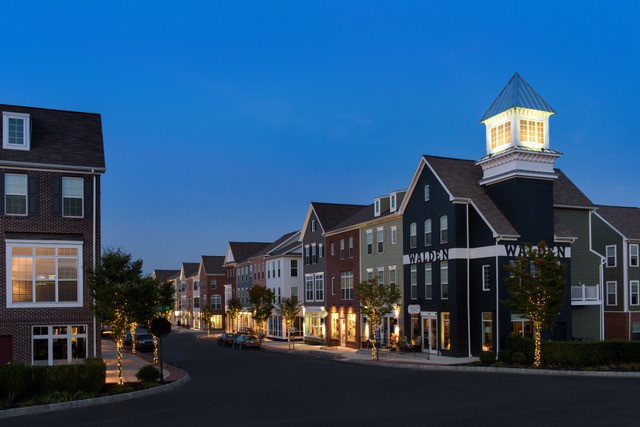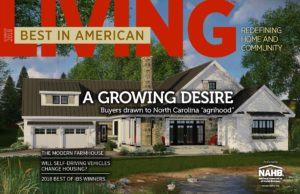When you mention the “clubhouse” in the context of new home communities, two things often come to mind – expensive and programmed. Neither of these are necessarily good qualities, or on the top five list for either developers or homebuilders. When you mention “neighborhood retail,” two other issues often come to mind – not enough rooftops (if you’re a developer), and yes please, in my community (if you are a homebuyer). Lancaster, PA-based Charter Homes & Neighborhoods, in true entrepreneurial private homebuilder fashion, embraces the space between those and offers an opportunity most other developers and homebuilders are turning their backs on.
Enter: “Crossroads,” an active and engaging mix of street-level retail with for-sale townhomes above. Even the name that Rob Bowman, Founder and President of Charter Homes & Neighborhoods, came up with for these spaces is laden with meaning. Conversation happens at the crossroads in every great town in America, where streets come together and create walkable village cores, even if those cores start out as nothing more than a gas station and a general store. It’s at the crossroads, in the center of town, where people met and shared stories, learned of neighbors who needed help, and made plans to offer it.
“We think about it as the ‘clubhouse redefined’ – replacing the old idea of developer-programmed architecture and events, with people and places that are authentic and functional,” says Bowman. Charter Homes & Neighborhoods weaves this retail concept into their neighborhoods, even those of just a few hundred homes. “It’s small businesses, located along tree-lined streets, where you can take a break and connect with friends, anytime.”

Photo courtesy of Charter Homes & Neighborhoods
Bowman believes that in a world of time famine, the next big amenity in community design is spontaneity, “having things to do and places to go – without a plan – that you can opt into or out of whenever you want to – with friends you already have, or a chance to make new ones”. For 35-year old Lindsay Dunn, who lives in Charter’s Walden neighborhood, works long hours in a senior marketing role, and is a single mom raising a young daughter, this seems to prove true. “In Walden, Crossroads is the place where a quick 5-minute walk with the dog after work turns into a lively 2-hour conversation with neighbors over microbrews. Without even thinking about it, Addie and I have established traditions like bike rides for Sunday morning brunch and peanut butter pie, while listening to live music on Walden Wednesdays,” she explains. “The business owners, staff and neighbors all know one another, so often your coffee order is waiting even before you place it, or you can call in a favor for an early morning breakfast sandwich before the café even opens,” she continues.
Over the years, Charter has learned what works, and what doesn’t. The secret? Finding local entrepreneurial businesses and creating great walkable spaces for them in new neighborhoods — places like a Pilates studio, microbrew pub, wine bar, hair salon, pet grooming spa, a great café and ice cream shop, an authentic family-run restaurant, and a local real estate company. “We started out with five grand and a two-room office,” shows the entrepreneurial spirit that has always been in Bowman’s blood. Now, after 25 years, and having won two National Housing Quality Awards and an NAHB Best in American Living Award, he’s more committed than ever to the idea that including successful small businesses in new home communities makes life better for those who live there.

Photo courtesy of Charter Homes & Neighborhoods
For those larger-scale developers who still say they need more rooftops to make neighborhood retail work, Bowman says, “you’re thinking about it the wrong way – change your perspective from the master plan to the neighborhood. The neighborhood is part of a larger community. It’s all about the experience and selling more homes for more money. You can’t apply the commercial/retail model, which is a different business.” In Charter’s case, many of the Crossroads businesses also enjoy up to 75 percent of their traffic from those outside the neighborhood, giving people from the surrounding community a reason to visit. That creates a magnet for new home shoppers as well. See how it’s working at charterhomes.com.
What Successful Neighborhood Small Business Takes
- Think like a start-up. You were one, once. There’s no formula to follow, and traditional commercial/retail metrics will kill it. Take the risk.
- Do what you can afford. Create spaces that are at scale with what you can afford. It doesn’t have to be huge; it just has to be done with passion and commitment.
- Business operators are out there. You just need to find them. Look for the young risk-takers who want a shot at a great new space, or the successful family with a following they can bring to your neighborhood in their new second location.
- Look at it from their perspective. Remember the hard work it takes to start and run a successful business, and think about it from your shop owner’s perspective.
- Enjoy the payoffs. Next to trails, every buyer says they want neighborhood retail. The investment in Crossroads over the years has created a demonstrable, tangible differentiator for Charter and is a key reason many buy in their neighborhoods.

Walden streetscape – photo courtsey of Charter Homes & Neighborhoods
—Teri Slavik-Tsuyuki, principal of tst ink, brings a customer-focused “how might we?” approach to creating communities and brands that connect and engage with how people want to live their lives

